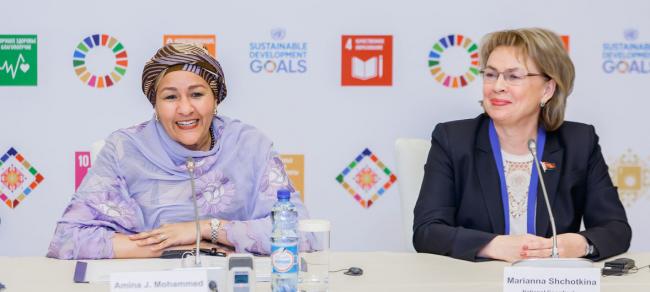
At leaders forum in Belarus, deputy UN chief urges concrete action on Global Goals
New York, Feb 22 (JEN): The 2030 Agenda for Sustainable Development is the most ambitious, universal, people-centred and planet-sensitive set of goals and targets ever conceived by the United Nations, Deputy Secretary-General Amina Mohammed told a regional leaders forum in Belarus on Wednesday.
Speaking in Minsk at the Regional SDGs Coordination Leaders Forum, ‘Building a partnership to underpin national sustainable development solutions,’ Ms. Mohammed said translating the Agenda into concrete Action is one of her top priorities and dubbed the framework’s associated Sustainable Development Goals (SDGs) “the global community’s roadmap to transform our world.”
She saw the meeting as an excellent opportunity to discuss implementation challenges, exchange best practices and explore new partnership modalities to advance the global goals.
“Our efforts to leave no one behind will be a test of our common vision, resolve and ingenuity,” she stressed.
Mohammed emphasized that a whole-of-government and whole-of-society approach must become the new norm – with meaningful multi-stakeholder partners central in designing, implementing, financing and evaluating development solutions.
Noting some positive trends and successful initiatives since the 2030 Agenda’s adoption, she stated that the SDGs were being implemented at global, regional, national, city and community levels, in developed and developing countries alike, “reflecting its universality in ownership and scope.”
“More concrete efforts are needed to leverage the capacities, networks, skills and resources of civil society, the private sector, academia, statistical bodies, local community associations and youth groups,” she added.
Ms. Mohammed outlined three key points, beginning with the SDGs need for “governments to go beyond traditional development programmes to tackle the complexity of the 2030 Agenda through integrated approaches, attuned to specific contexts.”
She listed a number of measures underway to help move the agenda forward, including governments incorporating the global goals into national plans and legislative frameworks.
“Achieving these goals will require defining new national pathways and priorities, and mobilizing the necessary financing, technology and expertise,” she asserted.
According to the UN deputy chief, the second key point is the importance of partnerships, saying “small and medium enterprises are slowly coming on board and need to be supported as they play a major role in most economies.”
Mohammad called fiscal incentives and enabling environments “game-changers” for governments, underlining the importance of long-term investing that price longer-term risks in sustainable development.
She called a data revolution, the third point, “the lynchpin” to ensure that programmes and interventions are targeting the poor and most vulnerable and marginalized communities and regions.
“Without high quality data, providing the right information on the right things at the right time, designing, financing, monitoring and evaluating effective policies is almost impossible,” she stated.
“Governments need to begin integrating different but comparable data sources; explore citizen-generated data to supplement national statistics; link evidence-based policy planning to financing the SDGs; and integrate data from the private sector, academia and civil society, particularly where indicators are not available from existing systems,” she elaborated.
The empowerment of youth and gender equality are also game changers, Mohammad continued, underscoring the need to address the issues of rights, voice and participation of women and the youth in the design and implementation of policy choices.
In closing, she maintained that together, “we can strengthen partnerships to achieve our shared ambition: an inclusive, equitable, prosperous and sustainable world, for everyone.”
United Nations/Egor Dubrovsky
Support Our Journalism
We cannot do without you.. your contribution supports unbiased journalism
IBNS is not driven by any ism- not wokeism, not racism, not skewed secularism, not hyper right-wing or left liberal ideals, nor by any hardline religious beliefs or hyper nationalism. We want to serve you good old objective news, as they are. We do not judge or preach. We let people decide for themselves. We only try to present factual and well-sourced news.







